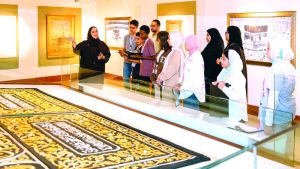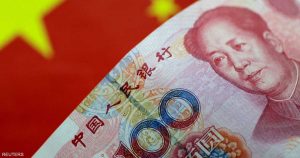L’Émirat de Sharjah accueille les 10 et 11 septembre la 14e édition du Forum international de la communication gouvernementale sous le thème « Communication pour la qualité de vie », avec plus de 22 plateformes interactives au Centre Expo Sharjah.
Son Altesse Cheikh Sultan bin Ahmed Al Qasimi, vice-dirigeant de Sharjah et président du Conseil des médias de Sharjah, prononcera le discours d’ouverture. L’événement constitue une plateforme intellectuelle mondiale explorant l’avenir des relations entre gouvernements et sociétés sous l’angle de la communication, plaçant les besoins de la communauté au cœur des priorités publiques.
Le forum de cette année, organisé par le Bureau des médias du gouvernement de Sharjah, propose une vision intégrée visant à étendre les rôles de la communication en un outil efficace impactant la sécurité alimentaire, la santé publique, l’éducation, la durabilité environnementale et l’économie verte — tous partageant l’objectif commun d’améliorer la qualité de vie humaine.
Sécurité alimentaire
Le forum aborde la « sécurité alimentaire » comme un pilier de la stabilité sociale et économique, examinant comment la communication gouvernementale peut contribuer à construire une conscience alimentaire durable et encourager l’adoption de systèmes agricoles et de technologies modernes optimisant l’utilisation des ressources et préservant la biodiversité.
Les rapports des Nations Unies indiquent qu’environ 670 millions de personnes pourraient souffrir de malnutrition d’ici 2030, avec environ 258 millions souffrant actuellement d’insécurité alimentaire sévère.
Ces chiffres alarmants soulignent la nécessité de stratégies de communication efficaces reliant la sensibilisation communautaire aux décisions souveraines, transformant les messages en véritables outils de changement.
Transformer les crises en opportunités
Le rôle de la communication dans la transformation des crises sanitaires en opportunités pour construire des communautés plus conscientes et réactives est mis en avant à travers des stratégies et campagnes de communication qui atténuent les effets de l’insécurité alimentaire et comblent les lacunes économiques et sociales. L’Organisation mondiale de la santé confirme que 45 % des décès d’enfants de moins de cinq ans sont liés à la malnutrition.
Ingénierie des stratégies
Alia Al Suwaidi, directrice du Bureau des médias, souligne que le forum de cette année poursuit l’établissement du concept de communication comme élément fondamental dans l’ingénierie des stratégies et la conduite du changement positif. La communication renforce la participation des communautés et construit la relation entre le gouvernement et le public sur des bases de transparence, confiance et autonomisation.
Depuis son lancement en 2012, le forum s’est imposé comme une plateforme intellectuelle influente à l’échelle régionale et internationale, réunissant décideurs, penseurs et experts dans un dialogue multidisciplinaire pour aborder les défis mondiaux sous l’angle de la communication et présenter des modèles et stratégies fondés sur la connaissance et l’expérience.
Éducation : un pont vers les solutions
Le forum accorde une importance particulière à l’éducation en tant qu’outil de communication à long terme pour autonomiser les générations, présentant des modèles de développement des programmes scolaires liés aux compétences futures telles que l’agriculture durable et la technologie moderne.
Dans un contexte connexe, le forum discute du rôle de la communication gouvernementale dans la reconfiguration des comportements urbains et des modes de vie dans les villes du futur à travers des campagnes de sensibilisation promouvant la réduction des déchets, le recyclage et un mode de vie écologiquement responsable.
Les statistiques montrent que l’humanité gaspille environ 1,3 milliard de tonnes de nourriture chaque année, soit 31 % de la production mondiale, tandis que des millions souffrent de la faim.
Récits gouvernementaux
Le forum présente le concept de récits gouvernementaux comme un outil majeur qui transmet l’information et contribue à façonner une nouvelle conscience, renforçant la relation entre gouvernements et public par un récit institutionnel participatif.
Il propose également une perspective de récit gouvernemental efficace qui dépasse la simple promotion des politiques pour simuler les besoins des gens dans un langage humain.
Dans des dossiers tels que le gaspillage alimentaire et le changement climatique, il sert de moyen de persuasion, d’outil de changement de comportement et de moteur émotionnel et social qui crée une transformation des concepts et des habitudes.
Économie verte
Le forum aborde également le rôle de l’économie verte dans la durabilité alimentaire et la qualité de vie, mettant en lumière les opportunités offertes par les politiques gouvernementales et les partenariats avec le secteur privé pour adopter des pratiques agricoles et des technologies réduisant les émissions de carbone jusqu’à 30 % d’ici 2050.
Les études des Nations Unies indiquent que chaque dollar investi dans l’agriculture durable rapporte des bénéfices économiques et sociaux 2,5 fois supérieurs, tandis que l’économie verte pourrait créer 24 millions d’emplois dans le monde d’ici 2030.
Le forum met en lumière le rôle des médias et des récits gouvernementaux dans la reconfiguration du comportement individuel, incitant les individus et les institutions à adopter un mode de vie plus conscient et responsable. Il discute également des opportunités de l’économie verte dans la création de nouveaux emplois, l’élargissement de la justice environnementale et le rôle de la communication dans la construction de partenariats renforçant la confiance entre gouvernements et communautés.
Médias numériques pour renforcer l’immunité cybernétique
Une session aborde l’intégration entre les médias numériques et la communication gouvernementale pour construire un environnement numérique plus sûr et durable pour différentes catégories de la société, et établir un système numérique renforçant l’immunité cybernétique.
Les principaux sujets abordés sont :
- La contribution des médias numériques à la prévention, la détection et la sensibilisation contre les menaces cybernétiques.
- Le rôle des médias numériques dans le soutien des stratégies nationales de cybersécurité.
- Les méthodes pour faire face aux campagnes de désinformation et aux attaques informationnelles.
- Le rôle des lois locales et internationales dans la lutte contre la cybercriminalité.
- Les mécanismes pour établir des campagnes conjointes entre les entités gouvernementales et les médias pour renforcer l’immunité cybernétique communautaire.
- L’importance de comprendre les types de cybercriminalité et leurs impacts sur les individus, les entreprises et les institutions gouvernementales.
- L’impact des campagnes médiatiques dans la sensibilisation à la sécurité numérique et la réduction des risques potentiels.
Journalisme à l’ère de l’intelligence artificielle
Les transformations numériques et l’essor de l’intelligence artificielle ont modifié les concepts du journalisme et des médias ainsi que les méthodes de production et de présentation du contenu d’information. Avec cette intégration croissante entre le journalisme et les technologies numériques, le débat sur la dépendance à l’IA dans le journalisme a émergé, englobant diverses dimensions positives et négatives sur les plans professionnel et éthique. Le débat ouvre un dialogue sur la réalité du journalisme à l’ère de l’IA, les défis et le développement massif provoqué par cette intégration, visant à trouver des mécanismes et des visions pour créer un équilibre professionnel entre les valeurs journalistiques traditionnelles et les outils d’IA.
Intelligence artificielle et ses applications juridiques
La présence de l’IA dans divers aspects de la vie a créé un besoin urgent de compréhension approfondie de la manière d’utiliser cette technologie dans les secteurs vitaux, notamment l’éducation, la législation et la communication gouvernementale. Les technologies d’IA sont devenues un moteur important de la qualité de vie des individus, se manifestant dans le développement de systèmes de santé proactive, l’amélioration de la gestion des ressources alimentaires et la planification urbaine intelligente répondant aux besoins des populations.
Elles contribuent également à renforcer la sécurité alimentaire grâce à la prévision des saisons agricoles et des crises climatiques, à l’amélioration des chaînes d’approvisionnement, et à renforcer la sécurité sanitaire par des outils de diagnostic précoce, la gestion des données médicales et l’orientation des politiques de santé basées sur une analyse précise. Cette session traite des transformations induites par l’IA aux niveaux local et mondial, en mettant l’accent sur ses applications juridiques, son impact sur les pratiques professionnelles et l’importance de construire des cadres éthiques et législatifs qui suivent ce développement technologique, garantissant que l’humain reste au cœur du processus de développement.













Recommended for you
مدينة المعارض تنجز نحو 80% من استعداداتها لانطلاق معرض دمشق الدولي
طالب الرفاعى يؤرخ لتراث الفن الكويتى فى "دوخى.. تقاسيم الصَبا"
تقديم طلبات القبول الموحد الثلاثاء و640 طالبا سيتم قبولهم في الطب
البريد المصري: لدينا أكثر من 10 ملايين عميل في حساب التوفير.. ونوفر عوائد يومية وشهرية وسنوية
الجغبير: القطاع الصناعي يقود النمو الاقتصادي
سمو الشيخ عيسى بن سلمان بن حمد آل خليفة يستقبل سفير الولايات المتحدة الأمريكية لدى مملكة البحرين